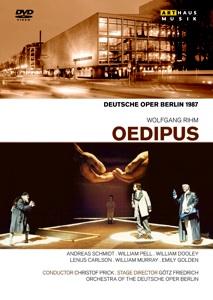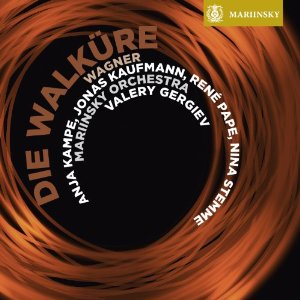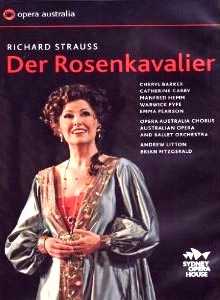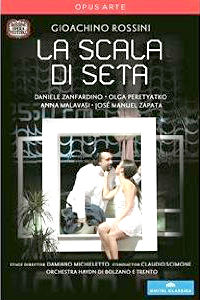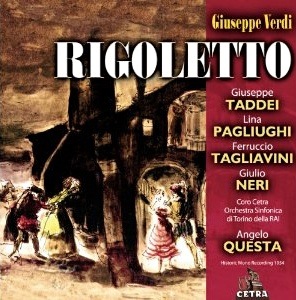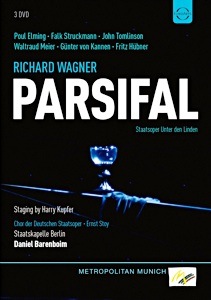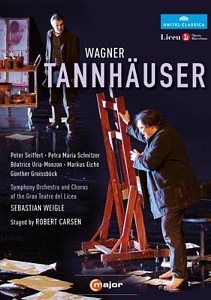
Adriel
Say this about Oedipus: The character’s got staying power.
Wagner is becoming an important calling card for Valery Gergiev and the Mariinsky Theatre.
Midway through his traversal of Wagner’s 10 mature operas for PentaTone, we’ve learned this about Marek Janowski:
It took about 30 minutes for me to grow restless watching the world premiere video of Gyorgi Ligeti’s Le Grand Macabre from Gran Teatre del Liceu.
For all its rich evocations of 18th century Vienna and skillful balancing of slapstick and the sublime, Der Rosenkavalier’s popularity has always been rooted in its vivid principal characters.
Unlike Mozart, the young Gioacchino Rossini seldom let his ambitions strain relations with employers.
Richard Wagner believed the key to any legend was contrasting the supernatural with human nature, and showing how the combination had no chance of enduring. In Lohengrin, the title’s character’s insistence on unconditional love and trust collide with the conditional expectations of the real world. The challenge is capturing the tale’s somber majesty without losing…
One of my adolescent pastimes was trolling the classical cut-out bins in record stores searching for overlooked gems or unfamiliar singers.
Certain opera productions become the stuff of legend as much for the circumstances surrounding the performance as for the musical results.
Certain contemporary opera directors have taken to portraying Wagner protagonists as visual artists to better illuminate the characters’ moral and aesthetic struggles.
The symbolism and themes of suffering and redemption in Parsifal have provided catnip for more than a few oddball stagings filled with Regie excesses.
“This is the end of Western culture,” Richard Strauss proclaimed after a rehearsal of his penultimate opera Die Liebe der Danae, in Salzburg in 1944. The octogenarian composer, increasingly on the outs with the Nazis and switched off from contemporary music currents, could well have identified with his protagonist Jupiter, a once-mighty God caught up in an off-kilter…
Giovanni Simone Mayr was one of the most important musical figures of his day, a man Rossini referred to as the “father of Italian opera” whom Napoleon personally lobbied to come work in Paris. Though he wrote nearly 70 operas and taught Donizetti and Bellini, the Bavarian-born composer had the misfortune of hitting his peak…
In the liner notes to his new Wagner CD, Rene Pape opines that performing the master’s work isn’t terribly different than performing Mozart. Both composers require singers to sustain a melodic line, manipulate vowels at the right moments and deploy dynamic gradations for dramatic effect. Call it German bel canto or natural speech, just don’t…
Robert Schumann said he devoted more love and energy to Manfred than any of his other compositions. It took him only about a month in 1848 to adapt a translation of Byron’s semi-autobiographical poem about a guilt-ridden noble into a program consisting of an overture and 15 pieces for chorus, orchestra and spoken voice. Schumann was…
Tchaikovsky’s Queen of Spades straddles two genres. With a macabre plot that explores the boundaries of human obsession, it’s an early psychological thriller that makes the audience engage in a kind of voyeurism Alfred Hitchcock loved. Yet the plot drawn from Pushkin and the striking Romantic score with its references to Mozart, Bizet and Grétry firmly…
The centennial observances of Gustav Mahler’s death have not turned up a surfeit of newly discovered performances, probably because his symphonies and song cycles have long been a calling card for serious artists and record labels. Though the industry archives may be picked clean, the estates of dead musicians are at least starting to kick…
Five decades before the Met turned to computer-assisted planks to help tell the story of Wagner’s Ring cycle, the company stirred controversy and comment with another staging of the tetralogy. General Manager Rudolf Bing imported a stark, abstract production from the Salzburg Festival in order to secure the services of Herbert von Karajan, who not…
A documentary about the heldentenor Max Lorenz would seem to be an ideal prism through which to examine the moral ambiguities and trade-offs of artistic life in the Third Reich. The preeminent Siegfried, Tristan and Tannhauser of the Nazi era was considered so essential to the success of Bayreuth that Winifred Wagner told Hitler that…
